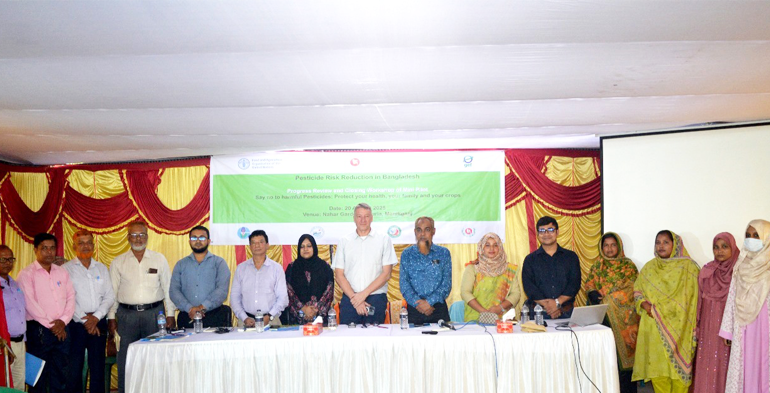
Agrilife24.com:The Food and Agriculture Organization of the United Nations (FAO) completed its Mini Pilot program for collection, storage and disposal of Empty Pesticide Container (EPC) in Saturia, Manikganj on 20th August 2025 at Nahar Garden. FAO’s Global Environment Facility (GEF) funded Pesticide Risk Reduction in Bangladesh project launched Mini Pilot program back in November 2024, to address the growing environmental and health risks posed by the improper disposal of empty pesticide packaging waste. The Pilot focused on voluntary collection and disposal of Primary Pesticide Packaging Waste (PPPW) which is set to make significant strides in managing hazardous waste produced by the country’s expanding agricultural sector. After eight months, 1.36 Tons of pesticide packaging waste was collected in total.
Martijn Van De Groep, Senior Technical & Policy Advisor, FAO Bangladesh, and Dr. Robiah Noor Ahmed, Deputy Director (DD), Department of Agriculture Extension (DAE), Manikganj graced the event while Mst. Tania Tabasum, UAO, DAE, Saturia, Manikganj was the chair.
With the widespread use of High-Yielding Varieties (HYVs) and hybrids in Bangladesh’s farming communities, and a shift towards cultivating high-value vegetables and fruits, the demand for pesticides has increased exponentially. Through raising awareness among farmers about safe handling of empty pesticide containers and various training programs, farmers and pesticide dealers of Saturia, Manikganj were encouraged to voluntarily collect and store empty pesticide containers at designated collection points. This program was launched to
contribute to safeguarding the environment by preventing groundwater contamination, protecting wildlife, reducing air pollution, supporting recycling efforts and maintaining the ecosystem balance which will eventually protect health, family and crops ensuring food safety.
Martijn Van De Groep, Senior Technical & Policy Advisor, FAO Bangladesh, emphasizing on the importance of having a sustainable disposal system for agricultural waste, stated, “For the last eight months FAO has been working with the Department of Agriculture Extension to promote safe farming practices amongst the farmers and pesticide dealers of Saturia. We also helped them implement those practices in real life, by providing them with protective equipment and piloting a system to successfully dispose of the hazardous pesticide packaging wastes. Now that the Mini Pilot initiative comes to an end, we look forward to collaborating with DAE and relevant private sector partners and continuing the effort in the future with the lessons learnt."
This pilot project is not just about waste disposal; it is about building a foundation for a nationwide system to manage pesticide waste responsibly. The lessons learned from the Mini-Pilot will provide valuable data for the Government of Bangladesh and industry stakeholders, to develop a safe and sustainable model for the entire country.
Dr. Robiah Noor Ahmed, Deputy Director (DD), DAE, stated, “Responsible pesticide use is key to food safety, sustainability, and farmer health but poor selling practices still pose risks. Stronger monitoring, education, and compliance are necessity now. A paid collection system is already helping with safe waste disposal. With reduced residues, Bangladesh can boost agricultural exports. Through awareness and innovation, we can secure a healthier, more prosperous future.”
Since November 2024, DAE officials and FAO personnel have educated over 1300 farmers, 100 pesticide dealers and 30 Sub Assistant Agriculture Officer, (SAAOs) on the proper handling and disposal of empty pesticide containers. The program conducted more than 10 courtyard meetings with farmers and their families to make them aware of safe agricultural practices. Over 30,000 Information, Education and Communication (IEC) materials and more than 5000 protective equipment (Gloves, goggles, aprons, bags, bins etc.) were distributed during this time. Two awareness videos were produced in this period for the farmers and pesticide dealers that can be used in future programs.
Mini Pilot Initiative - At A Glance!
• Increased awareness among farmers and pesticide dealers about the risks associated with improper
disposal and the importance of participating in the collection system
• Farmers collect and store agricultural waste in a dustbin or bag
• Farmers deposit the waste to the collection points (Pesticide dealer’s shops)
• Transport waste from collection point to collection center
• Transport empty pesticide containers from collection center to Lafarge Cement Industry for incineration
• Safe disposal of incinerated ash
The initiative was a crucial step toward improving the environmental and health standards in Bangladesh’s agricultural sector. It is expected that, with the cooperation of farmers, government officials, and industry representatives, this pilot will pave the way for broader implementation across the country.
FAO’s commitment to ensure food safety and sustainability
FAO, through its Pesticide Risk Reduction in Bangladesh project is working with the Government of Bangladesh to reduce the negative environmental and health impacts of hazardous pesticide use in the country. By addressing the risks posed by empty pesticide packaging waste, the project is contributing to safer agricultural practices and a cleaner environment for the future focusing on the "Four Betters"—Better Production, Better Nutrition, a Better Environment, and a Better Life.